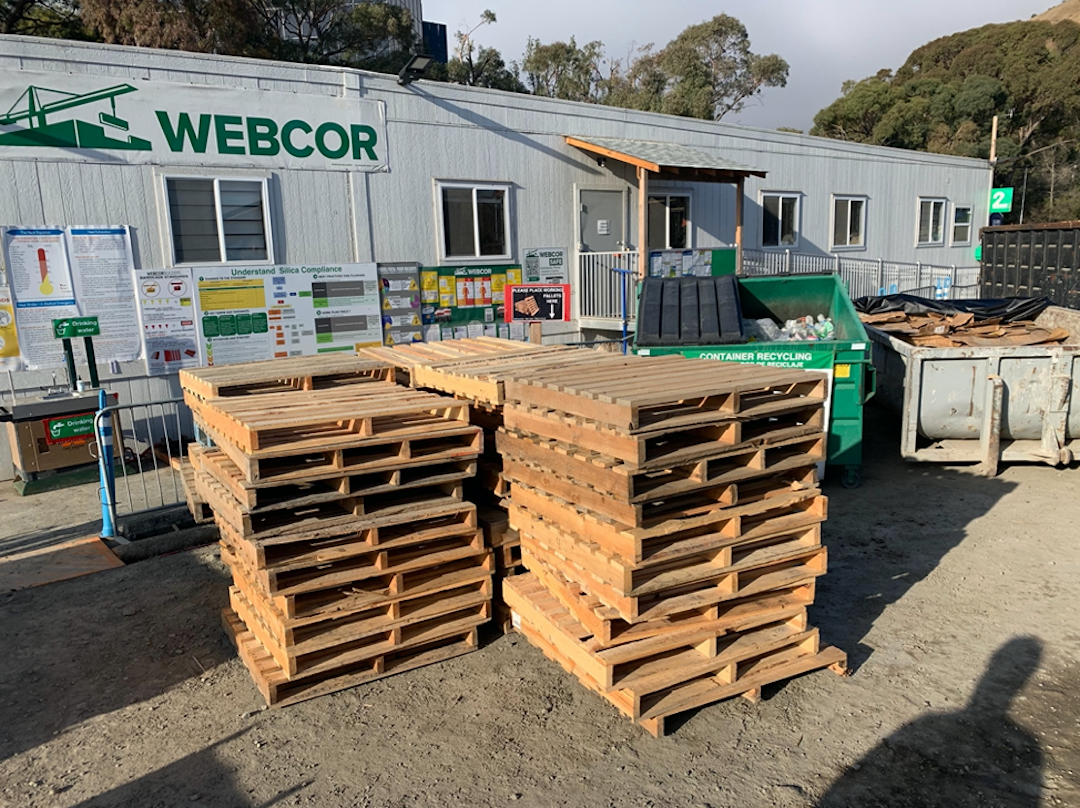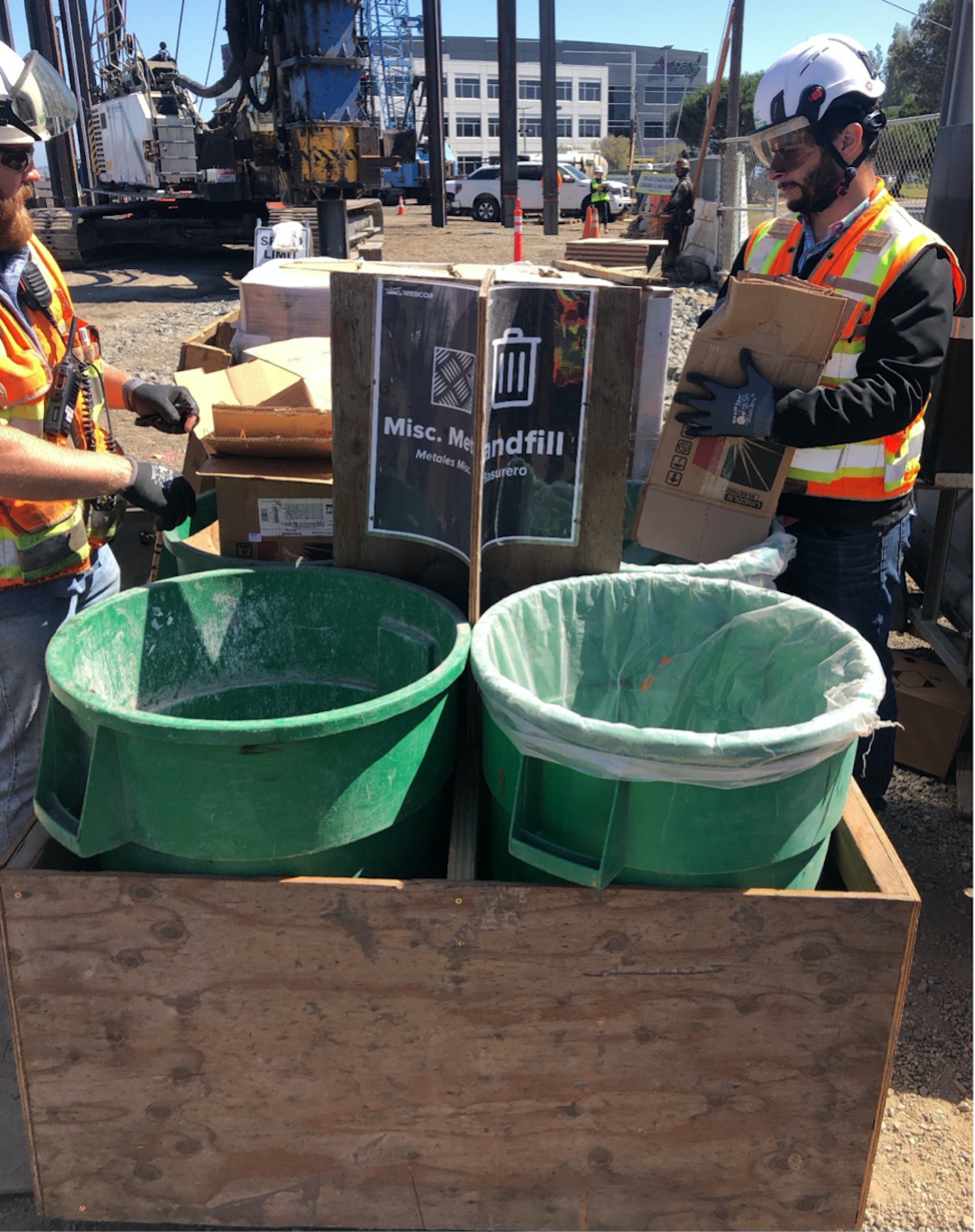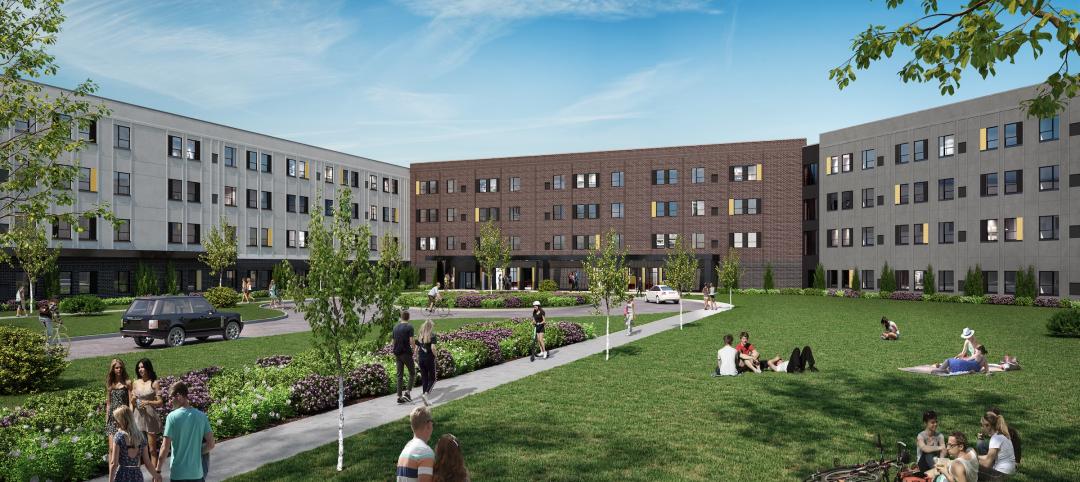Genesis Marina, a 570,000-sf commercial office and laboratory project in Brisbane, Calif., has become the world’s first Total Resource Use and Efficiency (TRUE) precertified construction site. The developers are Phase 3 Real Estate Partners, and Bain Capital Real Estate.
The TRUE program is administered by Green Business Certification, Inc. (GBCI), which also implements LEED certification. The TRUE precertification recognizes projects that have implemented the fundamental actions and policies needed to effectively pursue zero waste and have demonstrated a commitment to achieving TRUE certification.
“The companies that will call Genesis Marina home are discovering the future. Programs like the TRUE certification, through its focus on sustainability, reusability, and social responsibility, are key to that future as well,” says Michael Gerrity, President of Phase 3 Real Estate Partners.
Webcor, the general contractor on Genesis Marina, has been in partnership with zero waste consultant All About Waste since March 2021. Located on a former landfill, the Genesis Marina project site is expected to divert over 90% of its waste from landfills and incineration. These efforts help significantly reduce carbon emissions, support public health, and promote local jobs and alternatives to the traditional approach of disposing of the materials – aligning with stringent California policies driving the Golden State to a circular economy future.
“The official TRUE certification standard was designed for existing facilities, not construction sites,” says Denise Braun, principal at All About Waste. “There’s a lot of potential for growth in that arena, and Webcor has created the foundation to manage both on-site field and in-office waste in an effective, progressive manner.”
“While LEED focuses on mainly energy and water efficiency” – Genesis Marina is pursuing LEED Gold certification – “TRUE certification helps the site dramatically reduce waste that is brought in while also ensuring that removed waste is reused and diverted from becoming trash. TRUE is a rigorous zero waste program in part because it does not accept incineration as a diversion strategy,” says Celeste McMickle, director at the U.S. Green Building Council.

The pursuit of TRUE certification directly aligns with Webcor’s corporate social responsibility (CSR) strategy: Two of the Waste Management goals established on its CSR website state the company’s commitments to implementing a TRUE program for zero waste on a jobsite by the end of next year and to reducing overall waste by 2% annually.
“Construction is one of the leading industries in waste, but it doesn’t have to be,” says Soonrock Park, the Webcor senior project manager overseeing Genesis Marina. “TRUE encourages all participants, from designers to end users, to consider the full circular economy of the materials we bring to a site and use within our operations. The goal is to divert all solid waste from the landfill, incineration, and the environment.”
“About 65% of all U.S. waste comes from construction and demolition debris, yet in California only 40% of that C&D debris is diverted from landfills,” adds Webcor Sustainability Director Jenelle Shapiro. “To put it in perspective, our one construction
business, on average, generates 1,700 tons of C&D debris monthly, which annually is equivalent to 130 blue whales – the largest animal in the world. For perspective, a blue whale is the length of a Boeing 737. That is a lot of waste, and a lot of opportunity, and we are just one general contractor.”
Shapiro says Webcor didn’t pick an “easy” project. “It has no demolition debris, which usually accounts for the majority of the total diversion percentage weight. This means that meeting the minimum 90% diversion rate requirement is even more difficult than it would be on a more typical project, but we didn’t want to take the easy approach. We wanted to challenge ourselves and the market to make it feasible on any type of project!”
Achieving TRUE certification is no simple feat. To be considered eligible, projects must meet a minimum of seven program requirements (prerequisites) and attain at least 31 points on the TRUE scorecard. Such criteria includes implementing a zero waste policy by diverting 90% of all waste generated, as well as meeting all solid waste and recycling regulations.
“Many other certifications were designed decades ago to spur on sustainable design,” says Brock Hill, vice president at Premiere Recycle Company, a Recycling Certification Institute–certified waste hauler and processing facility managing the construction debris for Genesis Marina. “While they have had success, an entire industry has been built around achieving those points. Changing those certifications is synonymous to turning a moving cruise ship. Pursuing TRUE takes courage to blaze a new path; it's not a cookie-cutter process in current norms.”
“We need to change the mentality of personnel at all levels – field, office, vendors, manufacturers, etc. – and inspire them to care about waste and the way it’s being handled,” says Miranda Nowlen, a Webcor senior project engineer on Genesis Marina who has championed the project’s pursuit of TRUE certification. “Implementing a program like TRUE certification challenges the designers, general contractors, trade partners, vendors, and end users to be conscious of where the product began and where it will end – something that isn’t always considered.”
ABOUT WEBCOR
Webcor is a premier provider of commercial construction services, known for its innovative and efficient approach, wide range of experience, cost-effective design-build methodology, skill in concrete construction and expertise in building landmark projects. Founded in 1971 and honored as one of the Greenest Builders in California, Healthiest Employers, Top Corporate Philanthropists, Best Places to Work and Largest California Construction Firms, Webcor has offices in San Francisco, Alameda, San Jose, San Diego, and Los Angeles.
ABOUT ALL ABOUT WASTE
All About Waste is a woman- and minority-owned sustainability and zero waste consulting firm based in California. It is WBE, MBE, and DBE certified and has worked to certify more than 200 different LEED, WELL, Fitwel, and TRUE projects, including the first TRUE zero waste high-rise building in the world and the fst multi-tenant and residential building to earnTRUE certification in the world.
Related Stories
Student Housing | Jun 25, 2024
P3 student housing project with 176 units slated for Purdue University Fort Wayne
A public/private partnership will fund a four-story, 213,000 sf apartment complex on Purdue University Fort Wayne’s (PFW’s) North Campus in Fort Wayne, Indiana. The P3 entity was formed exclusively for this property.
Sustainability | Jun 24, 2024
CBRE to use Climate X platform to help clients calculate climate-related risks
CBRE will use risk analysis platform Climate X to provide climate risk data to commercial renters and property owners. The agreement will help clients calculate climate-related risks and return on investments for retrofits or acquisitions that can boost resiliency.
MFPRO+ News | Jun 24, 2024
‘Yes in God’s Backyard’ movement could create more affordable housing
The so-called “Yes in God’s Backyard” (YIGBY) movement, where houses of worship convert their properties to housing, could help alleviate the serious housing crisis affecting many communities around the country.
Student Housing | Jun 20, 2024
How student housing developments are evolving to meet new expectations
The days of uninspired dorm rooms with little more than a bed and a communal bathroom down the hall are long gone. Students increasingly seek inclusive design, communities to enhance learning and living, and a focus on wellness that encompasses everything from meditation spaces to mental health resources.
Museums | Jun 20, 2024
Connecticut’s Bruce Museum more than doubles its size with a 42,000-sf, three-floor addition
In Greenwich, Conn., the Bruce Museum, a multidisciplinary institution highlighting art, science, and history, has undergone a campus revitalization and expansion that more than doubles the museum’s size. Designed by EskewDumezRipple and built by Turner Construction, the project includes a 42,000-sf, three-floor addition as well as a comprehensive renovation of the 32,500-sf museum, which was originally built as a private home in the mid-19th century and expanded in the early 1990s.
Building Technology | Jun 18, 2024
Could ‘smart’ building facades heat and cool buildings?
A promising research project looks at the possibilities for thermoelectric systems to thermally condition buildings, writes Mahsa Farid Mohajer, Sustainable Building Analyst with Stantec.
University Buildings | Jun 18, 2024
UC Riverside’s new School of Medicine building supports team-based learning, showcases passive design strategies
The University of California, Riverside, School of Medicine has opened the 94,576-sf, five-floor Education Building II (EDII). Created by the design-build team of CO Architects and Hensel Phelps, the medical school’s new home supports team-based student learning, offers social spaces, and provides departmental offices for faculty and staff.
Mass Timber | Jun 17, 2024
British Columbia hospital features mass timber community hall
The Cowichan District Hospital Replacement Project in Duncan, British Columbia, features an expansive community hall featuring mass timber construction. The hall, designed to promote social interaction and connection to give patients, families, and staff a warm and welcoming environment, connects a Diagnostic and Treatment (“D&T”) Block and Inpatient Tower.
Codes | Jun 17, 2024
To avoid lawsuits, contractors and designers need to do more than comply with codes
Climate change is making design and construction more challenging and increasing the potential for lawsuits against building teams, according to insurance experts. Building to code is not enough to reduce liability because codes have not kept up with the rapid climate changes that are making extreme weather more common.
Concrete Technology | Jun 17, 2024
MIT researchers are working on a way to use concrete as an electric battery
Researchers at MIT have developed a concrete mixture that can store electrical energy. The researchers say the mixture of water, cement, and carbon black could be used for building foundations and street paving.

















